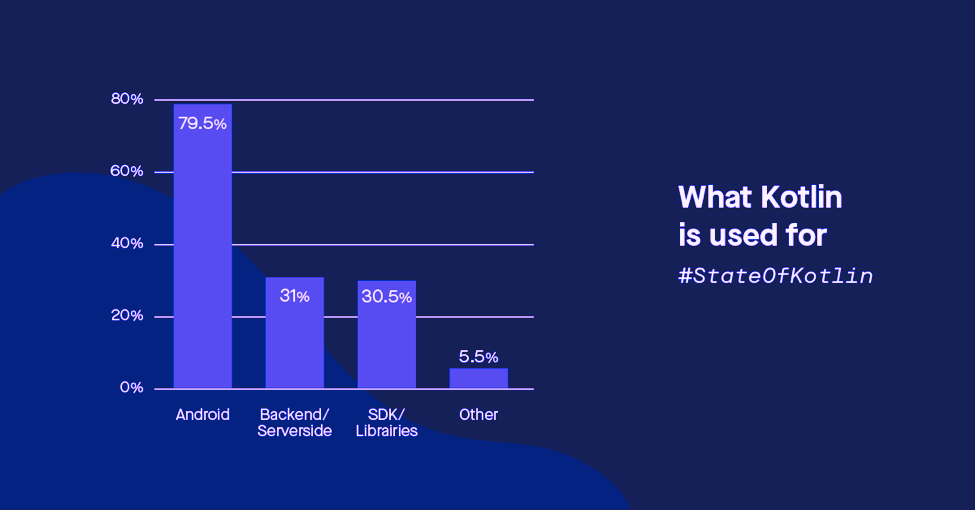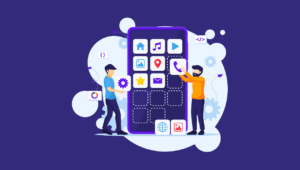In the modern world of mobile technology, where innovation and evolution happen at lightning speed, Android app development emerges as a cornerstone of digital advancement. At the forefront of this transformative wave is Kotlin—a language that has revolutionized how developers approach mobile applications since its inception by JetBrains in 2011 and subsequent endorsement by Google in 2017 as a preferred language for Android development. In this comprehensive guide, you’ll learn the process of mastering Kotlin programming language, the future of Android app development.
Kotlin is not merely a trend but a fundamental shift towards more efficient, expressive, and robust app development practices. By delving deep into the nuances of Kotlin, developers uncover a language that is not just about enhancing current capabilities but is a key to unlocking a future where app development is more intuitive, faster, and inherently safer.
Mastering Kotlin: Unveiling the Language of Tomorrow
Kotlin, with its pragmatic approach to problem-solving, offers a blend of functionality and simplicity that challenges the status quo of Android development. Its design, aimed at fixing the shortcomings of Java, provides a level of expressiveness and safety that was previously hard to achieve.
The language’s adoption skyrocketed after Google’s official support, highlighting its significance in the Android ecosystem. Kotlin’s rise is a testament to its ability to streamline development processes, reduce error rates, and foster a more vibrant and inclusive developer community. Its introduction marked a pivotal moment, transforming Kotlin from a mere alternative to the cornerstone of modern Android app development. Keep reading this comprehensive guide, and you’ll learn the process of mastering Kotlin programming language, the future of Android app development.
The Kotlin Advantage: Elevating Development to New Heights
Enhanced Readability and Efficiency
Kotlin’s concise syntax minimizes boilerplate code and elevates code readability to new heights, enabling developers to convey complex logic in a more accessible and straightforward manner. This reduction in verbosity facilitates quicker comprehension, allowing teams to collaborate more effectively and speeding up the development cycle.
Furthermore, Kotlin’s emphasis on readability and conciseness aids in maintaining and scaling applications, making it an invaluable asset for both small projects and large, complex enterprise-level solutions.
Unparalleled Safety Features Mastering Kotlin
Beyond its conciseness, Kotlin introduces robust safety features that address common pain points in app development, such as the dreaded null pointer exceptions. By integrating null safety at the language level, Kotlin significantly minimizes the risk of runtime errors, fostering a development environment where stability and reliability are paramount. This focus on safety is a game-changer, dramatically improving app quality and user experience by ensuring smoother, more reliable applications.
Seamless Interoperability and Beyond
Kotlin’s compatibility with Java is a critical feature, allowing for a smooth transition and integration into existing projects without overhauling the entire codebase. This interoperability extends Kotlin’s reach, enabling developers to leverage existing Java libraries and frameworks while enjoying Kotlin’s advanced features.
Additionally, Kotlin’s adaptability is showcased in its applicability across various development arenas—be it server-side development, desktop applications, or even front-end web development with Kotlin/JS, demonstrating its potential to be a universal language for all platforms.
Championing Modern Development Practices
Kotlin is not just a language; it’s a catalyst for embracing modern development methodologies. Thanks to features like coroutines for asynchronous programming, it encourages a more functional programming approach, which simplifies complex operations such as network calls or database transactions. Adopting modern practices encourages developers to write code that is efficient but also clean, maintainable, and aligned with contemporary development standards and expectations.
The Future is Kotlin Programming Language: Beyond Android

The widespread adoption of Kotlin within the Android community clearly indicates its pivotal role in the future of mobile development. Google’s endorsement of Kotlin as a first-class language for Android underscores its importance and sets the stage for a Kotlin-centric development ecosystem. This strategic move by Google validates Kotlin’s effectiveness and efficiency and signals a long-term commitment to evolving Android development alongside Kotlin’s innovative features.
Kotlin Programming Language Multiplatform: Bridging Platforms
Kotlin Multiplatform represents an ambitious endeavor to eliminate the traditional barriers between mobile platforms by enabling developers to share business logic across iOS and Android while retaining the ability to implement platform-specific UIs.
This approach has the potential to unify mobile development under a single language, reducing duplication of effort and fostering a more cohesive and efficient development process. As Kotlin Multiplatform matures, it stands to redefine cross-platform development, positioning Kotlin at the forefront of a unified, platform-agnostic approach to app development.
Embracing Kotlin: A Journey Toward Mastery
Embarking on the journey to master Kotlin is an exciting adventure filled with opportunities for personal and professional growth. The wealth of resources available to learners, from Kotlin’s official documentation to community-driven tutorials, forums, and video courses, provides a comprehensive ecosystem for developers to immerse themselves in.
This journey, while challenging, is enriching, offering developers the chance to be at the cutting edge of Android development. Engage with innovative projects, and partake in the evolution of a language that is reshaping the future of mobile technology.
Navigating the Kotlin Ecosystem: Tools and Libraries
The Kotlin ecosystem has tools and libraries designed to enhance the development experience, making it more productive and enjoyable.
From the robust IntelliJ IDEA environment, which offers first-class support for Kotlin, to the plethora of Kotlin-specific libraries. Such as Ktor for building asynchronous servers and clients, and Exposed as an ORM framework for Kotlin, the ecosystem is teeming with resources. Leveraging these tools, developers can accelerate development cycles, simplify complex tasks, and focus on innovating rather than dealing with mundane coding tasks.
Furthermore, the Kotlin Extension Libraries (KTX) for Android significantly streamline the use of Android APIs. Making code more concise and idiomatic to Kotlin. This thriving ecosystem not only supports Kotlin’s growth but also encourages the community to contribute, ensuring continuous improvement and innovation.
Conclusion: Kotlin—A New Era in Development
As we stand at the threshold of a new era in mobile app development. Kotlin emerges not just as a tool, but as a visionary language that promises to lead the charge in creating more efficient, safe, and enjoyable apps.
Its rise to prominence within the Android ecosystem is a testament to its capabilities and potential to revolutionize how developers approach mobile applications. For those looking to make their mark in the competitive landscape of Android app development. So, mastering Kotlin is not an option—it’s a strategic imperative.
In this era of rapid technological advancement. Kotlin stands as a beacon of innovation, challenging developers to rethink what’s possible in app development. Its evolution from a novel language to the foundation of Android development is a transformation journey. Highlighting the industry’s readiness to embrace change and innovate.
The future of Android app development is not just about coding. So, it’s about creating experiences, solving problems, and making technology accessible—and Kotlin is at the forefront of this movement.








